Impact of Global Trade on UK Economy
VerifiedAdded on 2020/06/04
|15
|4355
|46
AI Summary
This assignment examines the impact of global trade and emerging economies on the UK economy. Students are required to analyze various aspects of this relationship, supported by research findings from reputable sources such as books, journals, and online publications. The analysis should delve into the complexities and implications of global trade for the UK's economic landscape.
Contribute Materials
Your contribution can guide someone’s learning journey. Share your
documents today.
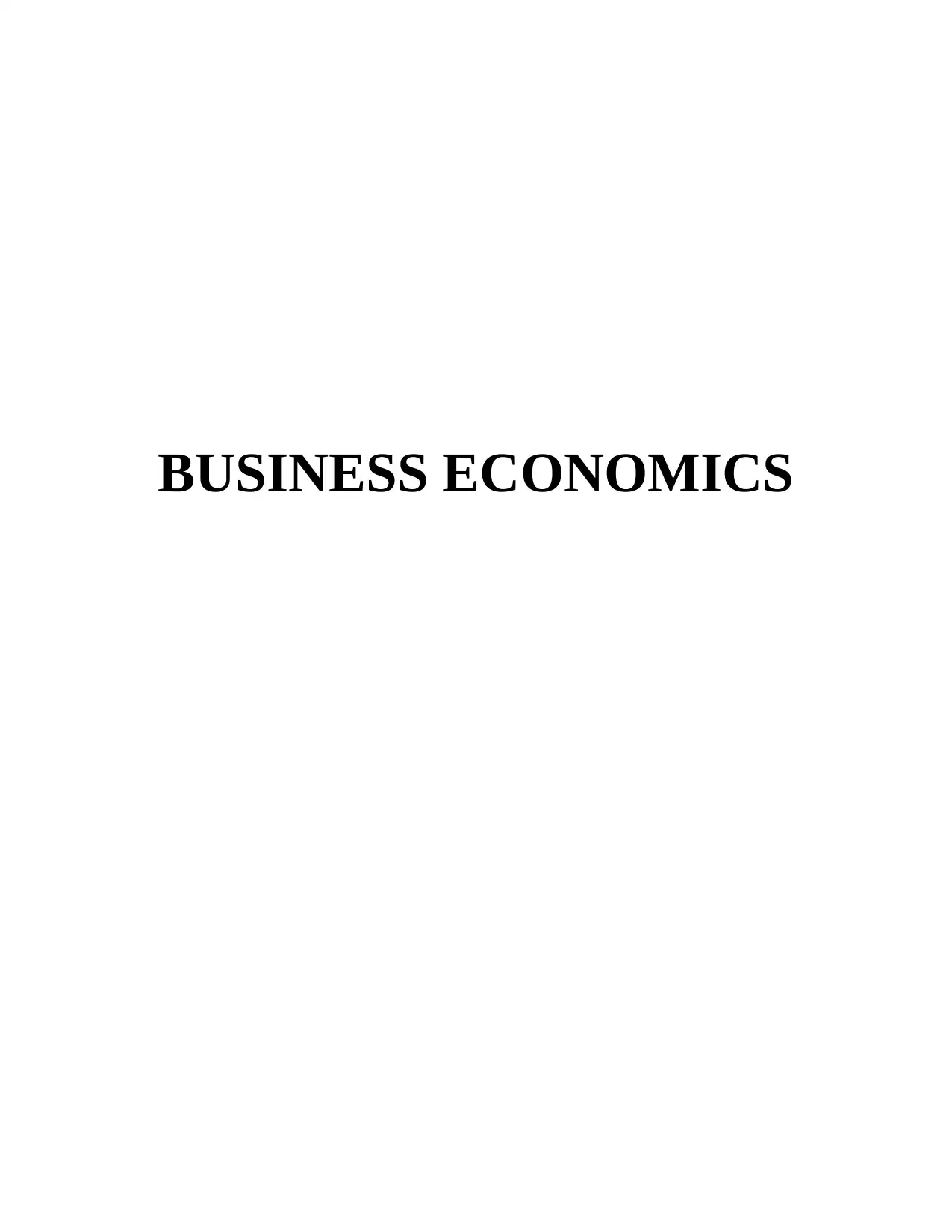
BUSINESS ECONOMICS
Secure Best Marks with AI Grader
Need help grading? Try our AI Grader for instant feedback on your assignments.
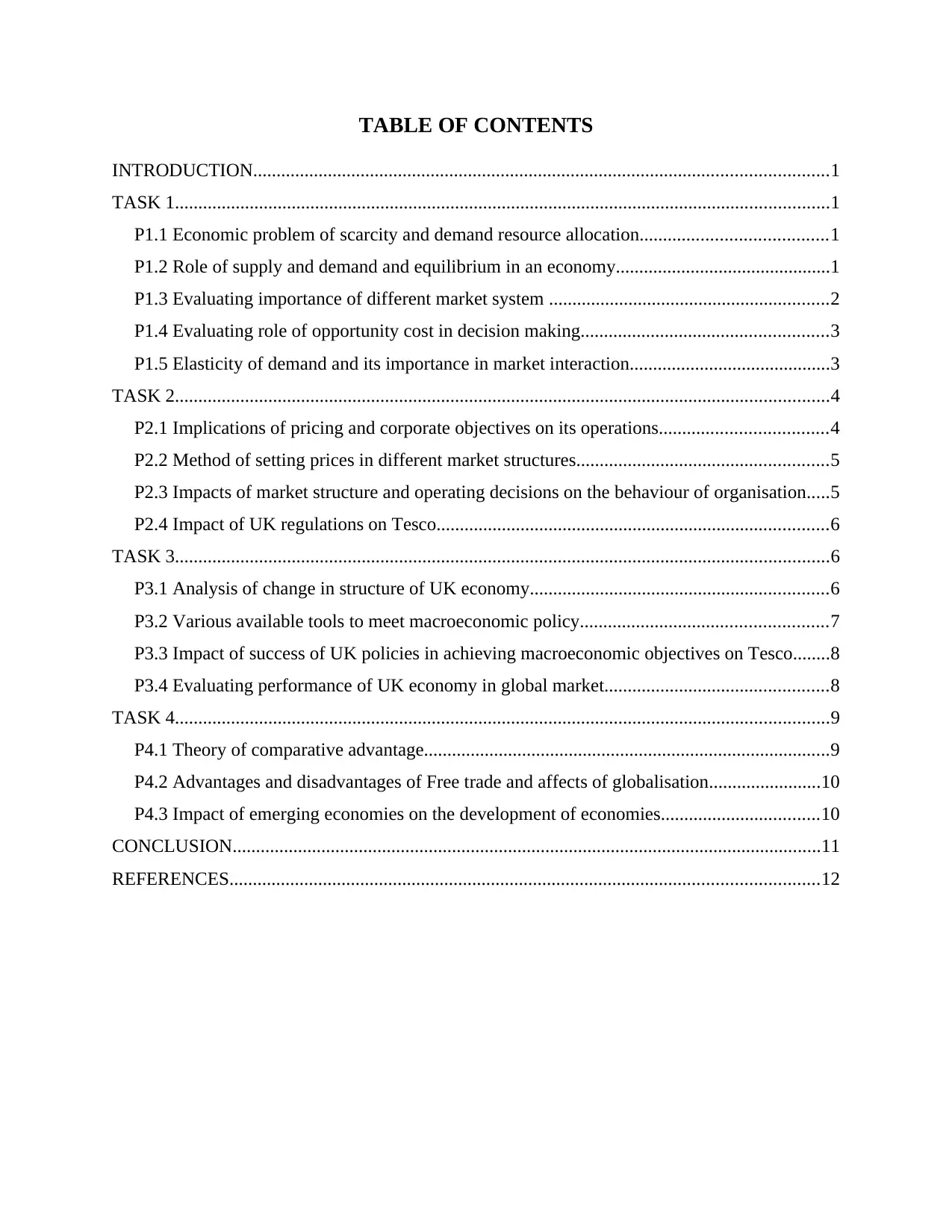
TABLE OF CONTENTS
INTRODUCTION...........................................................................................................................1
TASK 1............................................................................................................................................1
P1.1 Economic problem of scarcity and demand resource allocation........................................1
P1.2 Role of supply and demand and equilibrium in an economy..............................................1
P1.3 Evaluating importance of different market system ............................................................2
P1.4 Evaluating role of opportunity cost in decision making.....................................................3
P1.5 Elasticity of demand and its importance in market interaction...........................................3
TASK 2............................................................................................................................................4
P2.1 Implications of pricing and corporate objectives on its operations....................................4
P2.2 Method of setting prices in different market structures......................................................5
P2.3 Impacts of market structure and operating decisions on the behaviour of organisation.....5
P2.4 Impact of UK regulations on Tesco....................................................................................6
TASK 3............................................................................................................................................6
P3.1 Analysis of change in structure of UK economy................................................................6
P3.2 Various available tools to meet macroeconomic policy.....................................................7
P3.3 Impact of success of UK policies in achieving macroeconomic objectives on Tesco........8
P3.4 Evaluating performance of UK economy in global market................................................8
TASK 4............................................................................................................................................9
P4.1 Theory of comparative advantage.......................................................................................9
P4.2 Advantages and disadvantages of Free trade and affects of globalisation........................10
P4.3 Impact of emerging economies on the development of economies..................................10
CONCLUSION..............................................................................................................................11
REFERENCES..............................................................................................................................12
INTRODUCTION...........................................................................................................................1
TASK 1............................................................................................................................................1
P1.1 Economic problem of scarcity and demand resource allocation........................................1
P1.2 Role of supply and demand and equilibrium in an economy..............................................1
P1.3 Evaluating importance of different market system ............................................................2
P1.4 Evaluating role of opportunity cost in decision making.....................................................3
P1.5 Elasticity of demand and its importance in market interaction...........................................3
TASK 2............................................................................................................................................4
P2.1 Implications of pricing and corporate objectives on its operations....................................4
P2.2 Method of setting prices in different market structures......................................................5
P2.3 Impacts of market structure and operating decisions on the behaviour of organisation.....5
P2.4 Impact of UK regulations on Tesco....................................................................................6
TASK 3............................................................................................................................................6
P3.1 Analysis of change in structure of UK economy................................................................6
P3.2 Various available tools to meet macroeconomic policy.....................................................7
P3.3 Impact of success of UK policies in achieving macroeconomic objectives on Tesco........8
P3.4 Evaluating performance of UK economy in global market................................................8
TASK 4............................................................................................................................................9
P4.1 Theory of comparative advantage.......................................................................................9
P4.2 Advantages and disadvantages of Free trade and affects of globalisation........................10
P4.3 Impact of emerging economies on the development of economies..................................10
CONCLUSION..............................................................................................................................11
REFERENCES..............................................................................................................................12
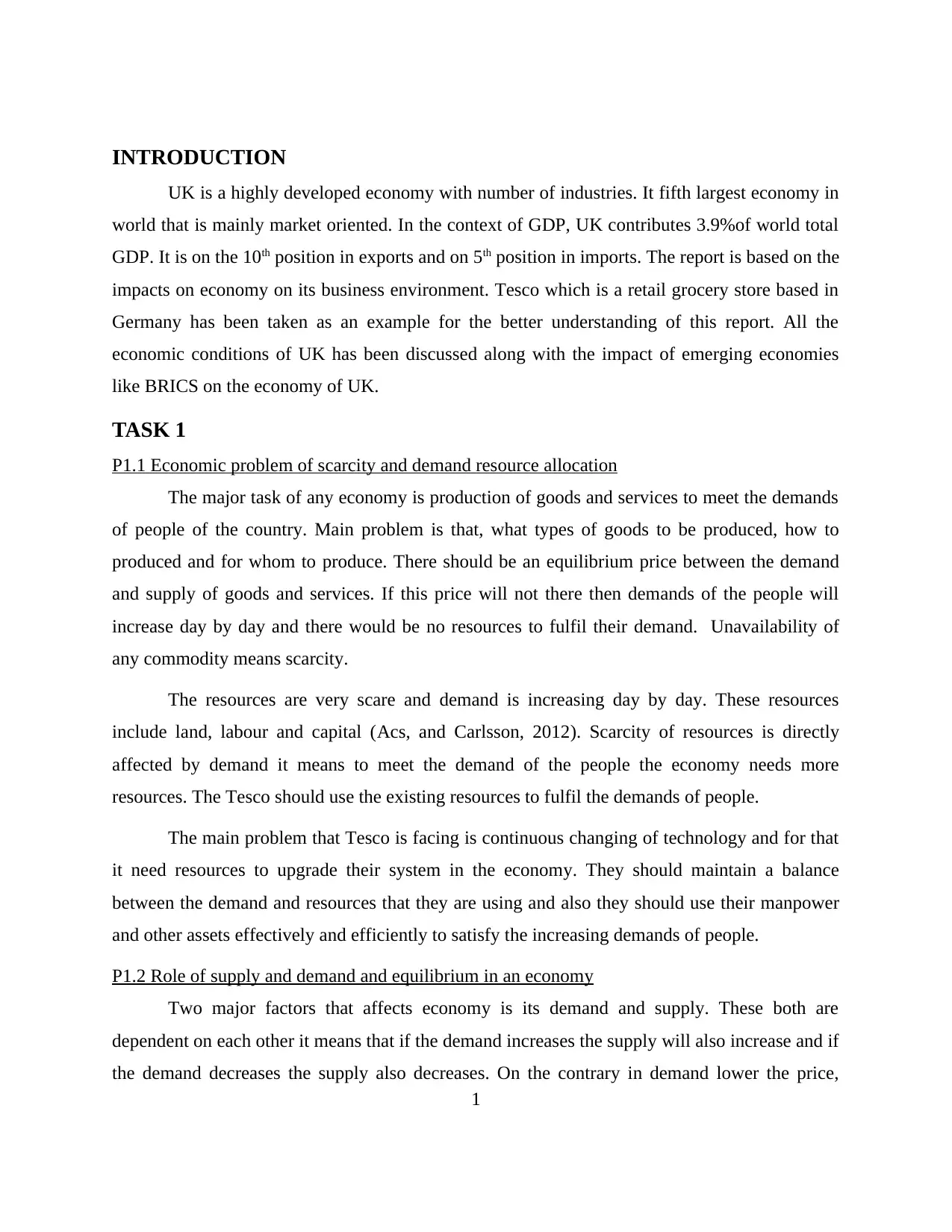
INTRODUCTION
UK is a highly developed economy with number of industries. It fifth largest economy in
world that is mainly market oriented. In the context of GDP, UK contributes 3.9%of world total
GDP. It is on the 10th position in exports and on 5th position in imports. The report is based on the
impacts on economy on its business environment. Tesco which is a retail grocery store based in
Germany has been taken as an example for the better understanding of this report. All the
economic conditions of UK has been discussed along with the impact of emerging economies
like BRICS on the economy of UK.
TASK 1
P1.1 Economic problem of scarcity and demand resource allocation
The major task of any economy is production of goods and services to meet the demands
of people of the country. Main problem is that, what types of goods to be produced, how to
produced and for whom to produce. There should be an equilibrium price between the demand
and supply of goods and services. If this price will not there then demands of the people will
increase day by day and there would be no resources to fulfil their demand. Unavailability of
any commodity means scarcity.
The resources are very scare and demand is increasing day by day. These resources
include land, labour and capital (Acs, and Carlsson, 2012). Scarcity of resources is directly
affected by demand it means to meet the demand of the people the economy needs more
resources. The Tesco should use the existing resources to fulfil the demands of people.
The main problem that Tesco is facing is continuous changing of technology and for that
it need resources to upgrade their system in the economy. They should maintain a balance
between the demand and resources that they are using and also they should use their manpower
and other assets effectively and efficiently to satisfy the increasing demands of people.
P1.2 Role of supply and demand and equilibrium in an economy
Two major factors that affects economy is its demand and supply. These both are
dependent on each other it means that if the demand increases the supply will also increase and if
the demand decreases the supply also decreases. On the contrary in demand lower the price,
1
UK is a highly developed economy with number of industries. It fifth largest economy in
world that is mainly market oriented. In the context of GDP, UK contributes 3.9%of world total
GDP. It is on the 10th position in exports and on 5th position in imports. The report is based on the
impacts on economy on its business environment. Tesco which is a retail grocery store based in
Germany has been taken as an example for the better understanding of this report. All the
economic conditions of UK has been discussed along with the impact of emerging economies
like BRICS on the economy of UK.
TASK 1
P1.1 Economic problem of scarcity and demand resource allocation
The major task of any economy is production of goods and services to meet the demands
of people of the country. Main problem is that, what types of goods to be produced, how to
produced and for whom to produce. There should be an equilibrium price between the demand
and supply of goods and services. If this price will not there then demands of the people will
increase day by day and there would be no resources to fulfil their demand. Unavailability of
any commodity means scarcity.
The resources are very scare and demand is increasing day by day. These resources
include land, labour and capital (Acs, and Carlsson, 2012). Scarcity of resources is directly
affected by demand it means to meet the demand of the people the economy needs more
resources. The Tesco should use the existing resources to fulfil the demands of people.
The main problem that Tesco is facing is continuous changing of technology and for that
it need resources to upgrade their system in the economy. They should maintain a balance
between the demand and resources that they are using and also they should use their manpower
and other assets effectively and efficiently to satisfy the increasing demands of people.
P1.2 Role of supply and demand and equilibrium in an economy
Two major factors that affects economy is its demand and supply. These both are
dependent on each other it means that if the demand increases the supply will also increase and if
the demand decreases the supply also decreases. On the contrary in demand lower the price,
1
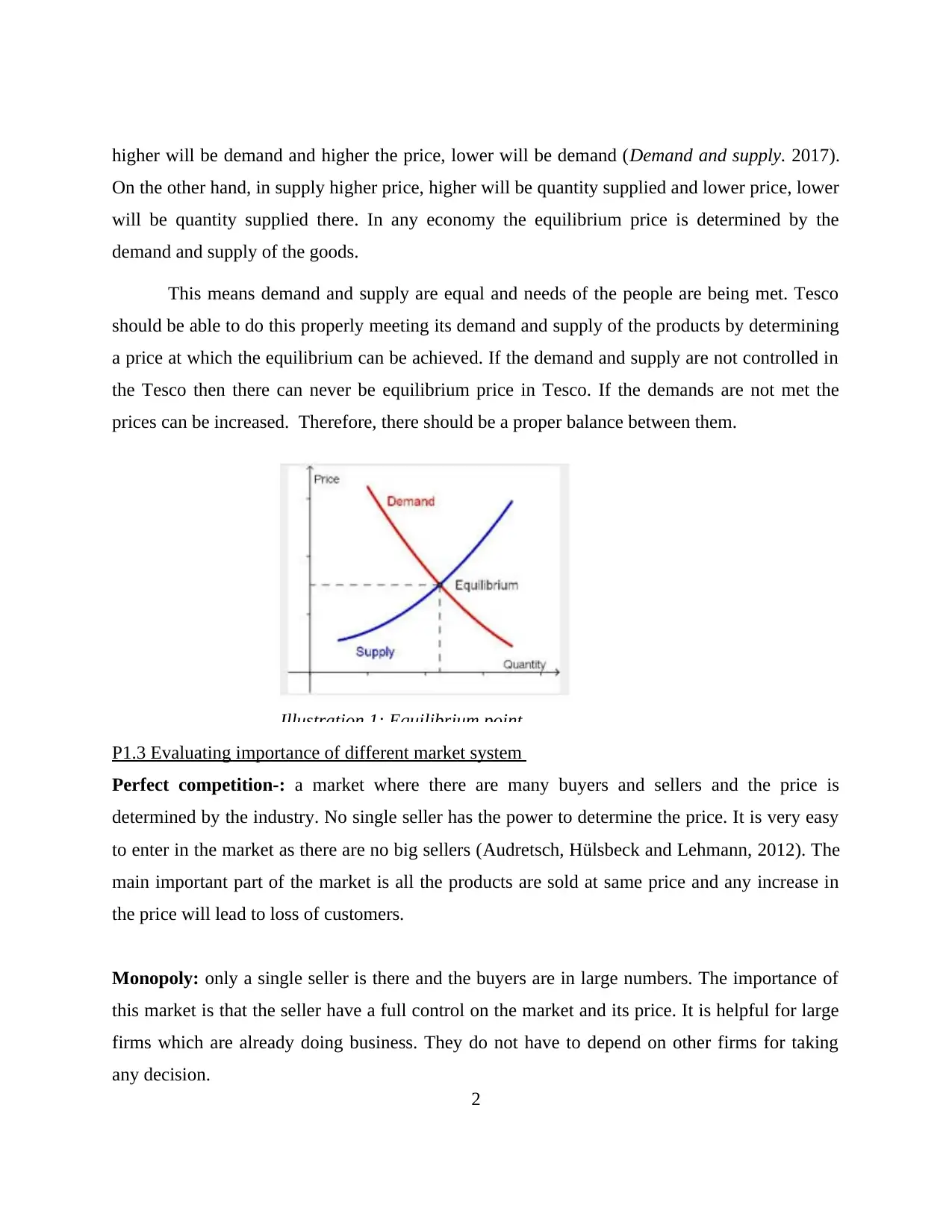
higher will be demand and higher the price, lower will be demand (Demand and supply. 2017).
On the other hand, in supply higher price, higher will be quantity supplied and lower price, lower
will be quantity supplied there. In any economy the equilibrium price is determined by the
demand and supply of the goods.
This means demand and supply are equal and needs of the people are being met. Tesco
should be able to do this properly meeting its demand and supply of the products by determining
a price at which the equilibrium can be achieved. If the demand and supply are not controlled in
the Tesco then there can never be equilibrium price in Tesco. If the demands are not met the
prices can be increased. Therefore, there should be a proper balance between them.
Illustration 1: Equilibrium point
P1.3 Evaluating importance of different market system
Perfect competition-: a market where there are many buyers and sellers and the price is
determined by the industry. No single seller has the power to determine the price. It is very easy
to enter in the market as there are no big sellers (Audretsch, Hülsbeck and Lehmann, 2012). The
main important part of the market is all the products are sold at same price and any increase in
the price will lead to loss of customers.
Monopoly: only a single seller is there and the buyers are in large numbers. The importance of
this market is that the seller have a full control on the market and its price. It is helpful for large
firms which are already doing business. They do not have to depend on other firms for taking
any decision.
2
On the other hand, in supply higher price, higher will be quantity supplied and lower price, lower
will be quantity supplied there. In any economy the equilibrium price is determined by the
demand and supply of the goods.
This means demand and supply are equal and needs of the people are being met. Tesco
should be able to do this properly meeting its demand and supply of the products by determining
a price at which the equilibrium can be achieved. If the demand and supply are not controlled in
the Tesco then there can never be equilibrium price in Tesco. If the demands are not met the
prices can be increased. Therefore, there should be a proper balance between them.
Illustration 1: Equilibrium point
P1.3 Evaluating importance of different market system
Perfect competition-: a market where there are many buyers and sellers and the price is
determined by the industry. No single seller has the power to determine the price. It is very easy
to enter in the market as there are no big sellers (Audretsch, Hülsbeck and Lehmann, 2012). The
main important part of the market is all the products are sold at same price and any increase in
the price will lead to loss of customers.
Monopoly: only a single seller is there and the buyers are in large numbers. The importance of
this market is that the seller have a full control on the market and its price. It is helpful for large
firms which are already doing business. They do not have to depend on other firms for taking
any decision.
2
Secure Best Marks with AI Grader
Need help grading? Try our AI Grader for instant feedback on your assignments.
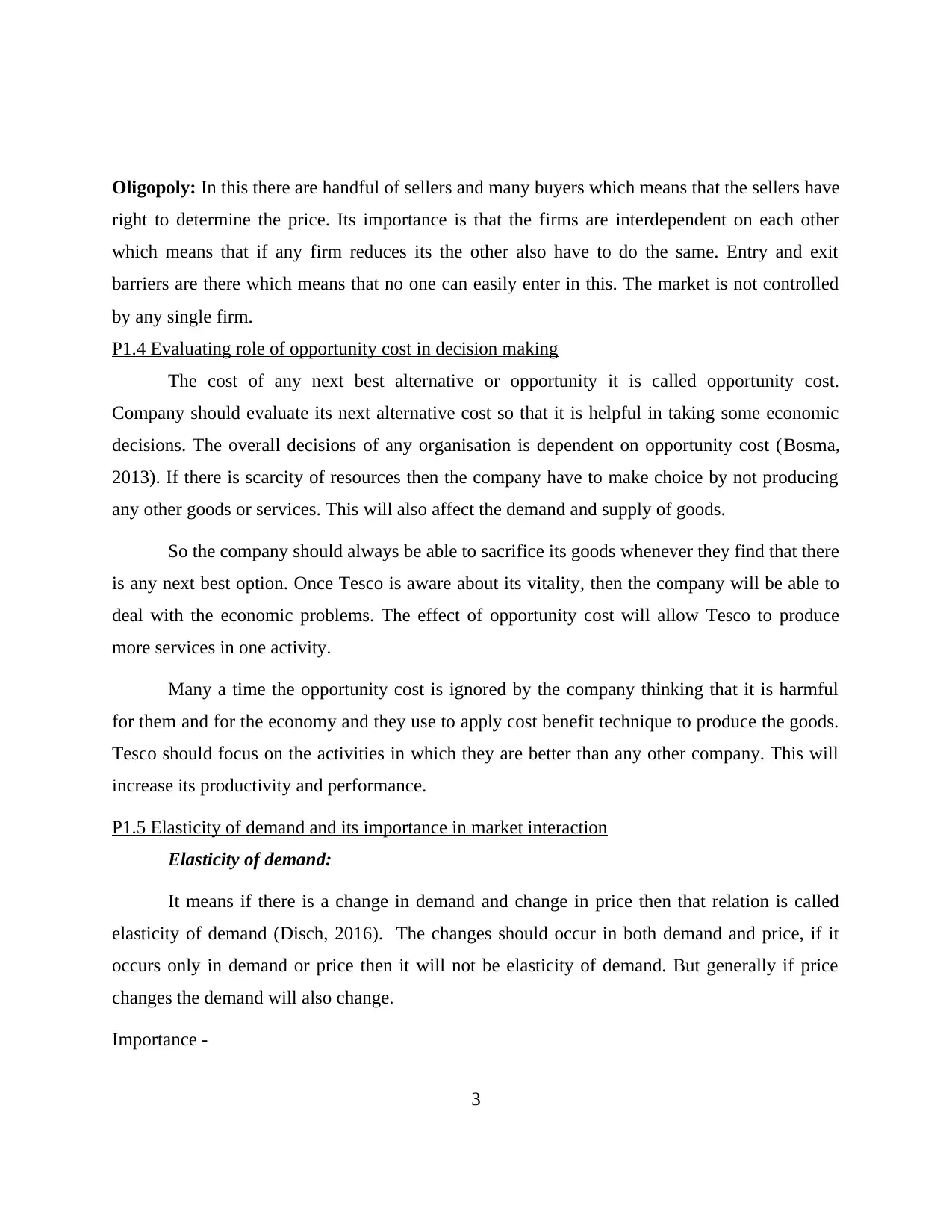
Oligopoly: In this there are handful of sellers and many buyers which means that the sellers have
right to determine the price. Its importance is that the firms are interdependent on each other
which means that if any firm reduces its the other also have to do the same. Entry and exit
barriers are there which means that no one can easily enter in this. The market is not controlled
by any single firm.
P1.4 Evaluating role of opportunity cost in decision making
The cost of any next best alternative or opportunity it is called opportunity cost.
Company should evaluate its next alternative cost so that it is helpful in taking some economic
decisions. The overall decisions of any organisation is dependent on opportunity cost (Bosma,
2013). If there is scarcity of resources then the company have to make choice by not producing
any other goods or services. This will also affect the demand and supply of goods.
So the company should always be able to sacrifice its goods whenever they find that there
is any next best option. Once Tesco is aware about its vitality, then the company will be able to
deal with the economic problems. The effect of opportunity cost will allow Tesco to produce
more services in one activity.
Many a time the opportunity cost is ignored by the company thinking that it is harmful
for them and for the economy and they use to apply cost benefit technique to produce the goods.
Tesco should focus on the activities in which they are better than any other company. This will
increase its productivity and performance.
P1.5 Elasticity of demand and its importance in market interaction
Elasticity of demand:
It means if there is a change in demand and change in price then that relation is called
elasticity of demand (Disch, 2016). The changes should occur in both demand and price, if it
occurs only in demand or price then it will not be elasticity of demand. But generally if price
changes the demand will also change.
Importance -
3
right to determine the price. Its importance is that the firms are interdependent on each other
which means that if any firm reduces its the other also have to do the same. Entry and exit
barriers are there which means that no one can easily enter in this. The market is not controlled
by any single firm.
P1.4 Evaluating role of opportunity cost in decision making
The cost of any next best alternative or opportunity it is called opportunity cost.
Company should evaluate its next alternative cost so that it is helpful in taking some economic
decisions. The overall decisions of any organisation is dependent on opportunity cost (Bosma,
2013). If there is scarcity of resources then the company have to make choice by not producing
any other goods or services. This will also affect the demand and supply of goods.
So the company should always be able to sacrifice its goods whenever they find that there
is any next best option. Once Tesco is aware about its vitality, then the company will be able to
deal with the economic problems. The effect of opportunity cost will allow Tesco to produce
more services in one activity.
Many a time the opportunity cost is ignored by the company thinking that it is harmful
for them and for the economy and they use to apply cost benefit technique to produce the goods.
Tesco should focus on the activities in which they are better than any other company. This will
increase its productivity and performance.
P1.5 Elasticity of demand and its importance in market interaction
Elasticity of demand:
It means if there is a change in demand and change in price then that relation is called
elasticity of demand (Disch, 2016). The changes should occur in both demand and price, if it
occurs only in demand or price then it will not be elasticity of demand. But generally if price
changes the demand will also change.
Importance -
3
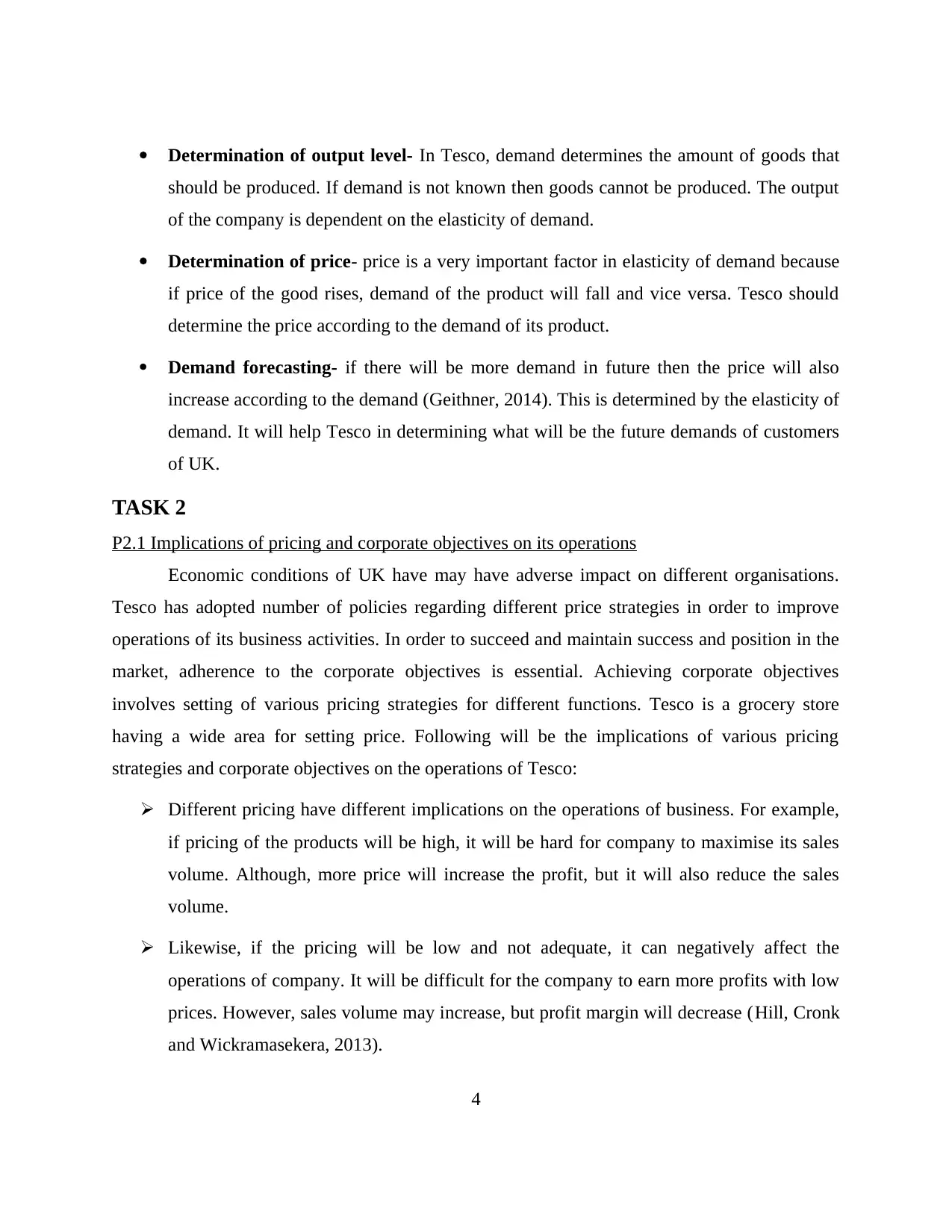
Determination of output level- In Tesco, demand determines the amount of goods that
should be produced. If demand is not known then goods cannot be produced. The output
of the company is dependent on the elasticity of demand.
Determination of price- price is a very important factor in elasticity of demand because
if price of the good rises, demand of the product will fall and vice versa. Tesco should
determine the price according to the demand of its product.
Demand forecasting- if there will be more demand in future then the price will also
increase according to the demand (Geithner, 2014). This is determined by the elasticity of
demand. It will help Tesco in determining what will be the future demands of customers
of UK.
TASK 2
P2.1 Implications of pricing and corporate objectives on its operations
Economic conditions of UK have may have adverse impact on different organisations.
Tesco has adopted number of policies regarding different price strategies in order to improve
operations of its business activities. In order to succeed and maintain success and position in the
market, adherence to the corporate objectives is essential. Achieving corporate objectives
involves setting of various pricing strategies for different functions. Tesco is a grocery store
having a wide area for setting price. Following will be the implications of various pricing
strategies and corporate objectives on the operations of Tesco:
Different pricing have different implications on the operations of business. For example,
if pricing of the products will be high, it will be hard for company to maximise its sales
volume. Although, more price will increase the profit, but it will also reduce the sales
volume.
Likewise, if the pricing will be low and not adequate, it can negatively affect the
operations of company. It will be difficult for the company to earn more profits with low
prices. However, sales volume may increase, but profit margin will decrease (Hill, Cronk
and Wickramasekera, 2013).
4
should be produced. If demand is not known then goods cannot be produced. The output
of the company is dependent on the elasticity of demand.
Determination of price- price is a very important factor in elasticity of demand because
if price of the good rises, demand of the product will fall and vice versa. Tesco should
determine the price according to the demand of its product.
Demand forecasting- if there will be more demand in future then the price will also
increase according to the demand (Geithner, 2014). This is determined by the elasticity of
demand. It will help Tesco in determining what will be the future demands of customers
of UK.
TASK 2
P2.1 Implications of pricing and corporate objectives on its operations
Economic conditions of UK have may have adverse impact on different organisations.
Tesco has adopted number of policies regarding different price strategies in order to improve
operations of its business activities. In order to succeed and maintain success and position in the
market, adherence to the corporate objectives is essential. Achieving corporate objectives
involves setting of various pricing strategies for different functions. Tesco is a grocery store
having a wide area for setting price. Following will be the implications of various pricing
strategies and corporate objectives on the operations of Tesco:
Different pricing have different implications on the operations of business. For example,
if pricing of the products will be high, it will be hard for company to maximise its sales
volume. Although, more price will increase the profit, but it will also reduce the sales
volume.
Likewise, if the pricing will be low and not adequate, it can negatively affect the
operations of company. It will be difficult for the company to earn more profits with low
prices. However, sales volume may increase, but profit margin will decrease (Hill, Cronk
and Wickramasekera, 2013).
4
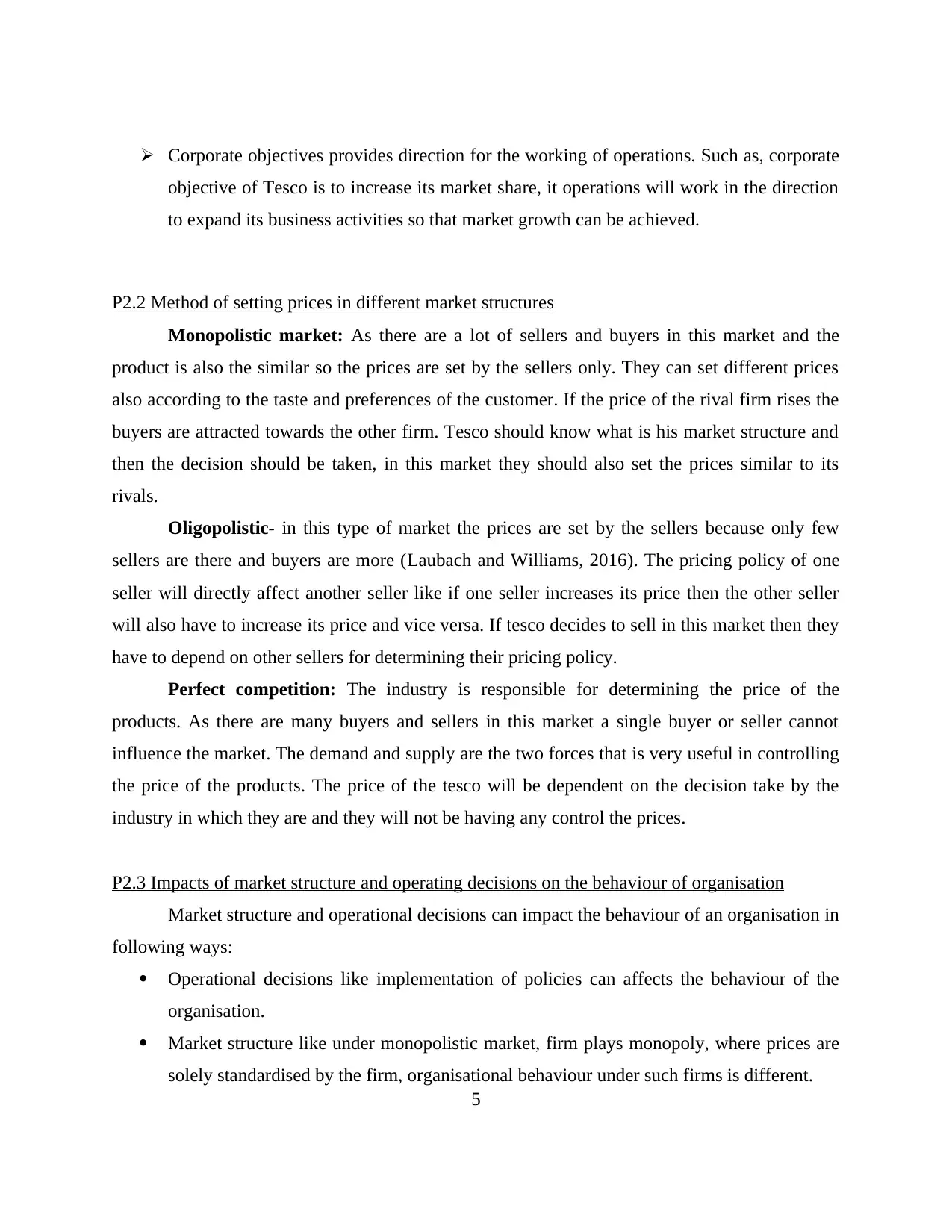
Corporate objectives provides direction for the working of operations. Such as, corporate
objective of Tesco is to increase its market share, it operations will work in the direction
to expand its business activities so that market growth can be achieved.
P2.2 Method of setting prices in different market structures
Monopolistic market: As there are a lot of sellers and buyers in this market and the
product is also the similar so the prices are set by the sellers only. They can set different prices
also according to the taste and preferences of the customer. If the price of the rival firm rises the
buyers are attracted towards the other firm. Tesco should know what is his market structure and
then the decision should be taken, in this market they should also set the prices similar to its
rivals.
Oligopolistic- in this type of market the prices are set by the sellers because only few
sellers are there and buyers are more (Laubach and Williams, 2016). The pricing policy of one
seller will directly affect another seller like if one seller increases its price then the other seller
will also have to increase its price and vice versa. If tesco decides to sell in this market then they
have to depend on other sellers for determining their pricing policy.
Perfect competition: The industry is responsible for determining the price of the
products. As there are many buyers and sellers in this market a single buyer or seller cannot
influence the market. The demand and supply are the two forces that is very useful in controlling
the price of the products. The price of the tesco will be dependent on the decision take by the
industry in which they are and they will not be having any control the prices.
P2.3 Impacts of market structure and operating decisions on the behaviour of organisation
Market structure and operational decisions can impact the behaviour of an organisation in
following ways:
Operational decisions like implementation of policies can affects the behaviour of the
organisation.
Market structure like under monopolistic market, firm plays monopoly, where prices are
solely standardised by the firm, organisational behaviour under such firms is different.
5
objective of Tesco is to increase its market share, it operations will work in the direction
to expand its business activities so that market growth can be achieved.
P2.2 Method of setting prices in different market structures
Monopolistic market: As there are a lot of sellers and buyers in this market and the
product is also the similar so the prices are set by the sellers only. They can set different prices
also according to the taste and preferences of the customer. If the price of the rival firm rises the
buyers are attracted towards the other firm. Tesco should know what is his market structure and
then the decision should be taken, in this market they should also set the prices similar to its
rivals.
Oligopolistic- in this type of market the prices are set by the sellers because only few
sellers are there and buyers are more (Laubach and Williams, 2016). The pricing policy of one
seller will directly affect another seller like if one seller increases its price then the other seller
will also have to increase its price and vice versa. If tesco decides to sell in this market then they
have to depend on other sellers for determining their pricing policy.
Perfect competition: The industry is responsible for determining the price of the
products. As there are many buyers and sellers in this market a single buyer or seller cannot
influence the market. The demand and supply are the two forces that is very useful in controlling
the price of the products. The price of the tesco will be dependent on the decision take by the
industry in which they are and they will not be having any control the prices.
P2.3 Impacts of market structure and operating decisions on the behaviour of organisation
Market structure and operational decisions can impact the behaviour of an organisation in
following ways:
Operational decisions like implementation of policies can affects the behaviour of the
organisation.
Market structure like under monopolistic market, firm plays monopoly, where prices are
solely standardised by the firm, organisational behaviour under such firms is different.
5
Paraphrase This Document
Need a fresh take? Get an instant paraphrase of this document with our AI Paraphraser
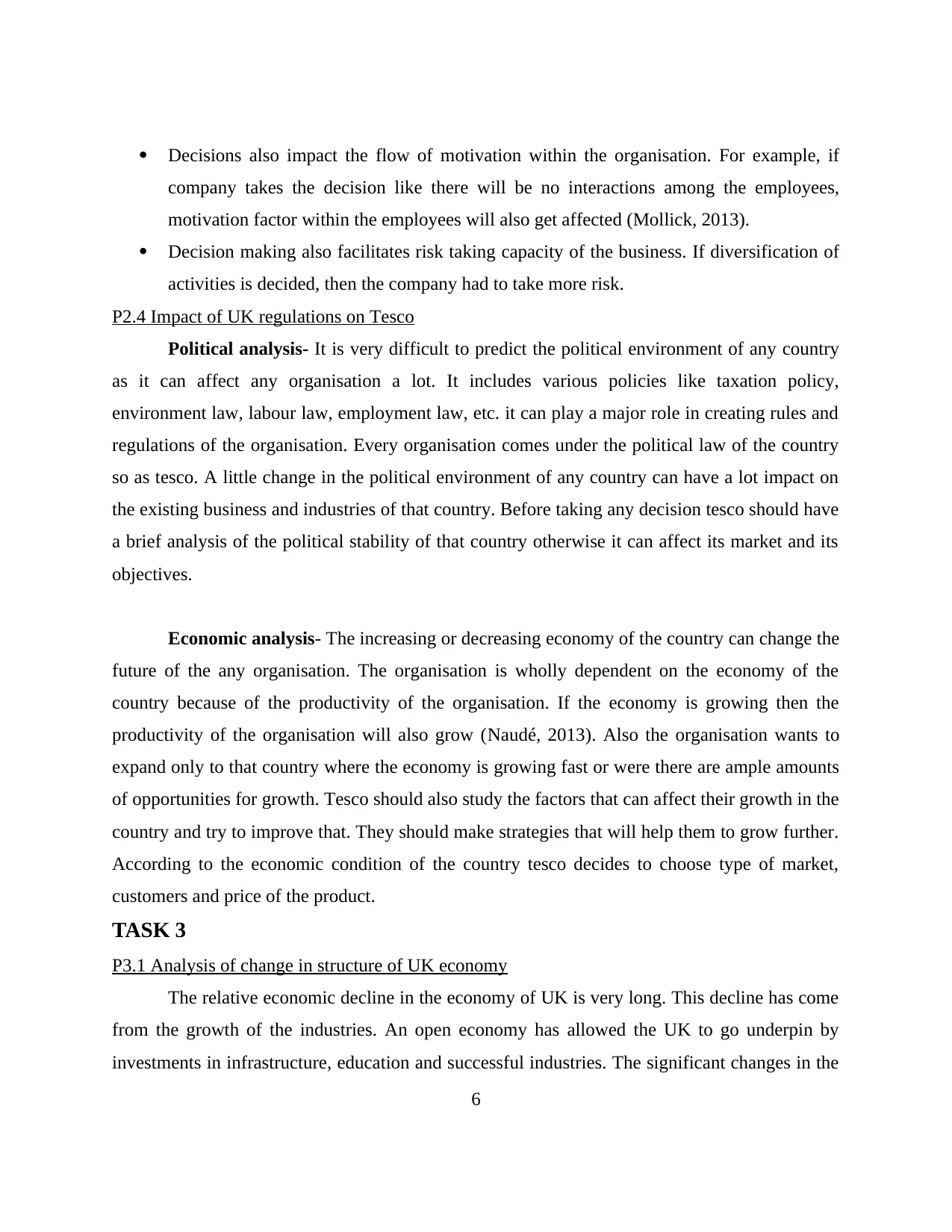
Decisions also impact the flow of motivation within the organisation. For example, if
company takes the decision like there will be no interactions among the employees,
motivation factor within the employees will also get affected (Mollick, 2013).
Decision making also facilitates risk taking capacity of the business. If diversification of
activities is decided, then the company had to take more risk.
P2.4 Impact of UK regulations on Tesco
Political analysis- It is very difficult to predict the political environment of any country
as it can affect any organisation a lot. It includes various policies like taxation policy,
environment law, labour law, employment law, etc. it can play a major role in creating rules and
regulations of the organisation. Every organisation comes under the political law of the country
so as tesco. A little change in the political environment of any country can have a lot impact on
the existing business and industries of that country. Before taking any decision tesco should have
a brief analysis of the political stability of that country otherwise it can affect its market and its
objectives.
Economic analysis- The increasing or decreasing economy of the country can change the
future of the any organisation. The organisation is wholly dependent on the economy of the
country because of the productivity of the organisation. If the economy is growing then the
productivity of the organisation will also grow (Naudé, 2013). Also the organisation wants to
expand only to that country where the economy is growing fast or were there are ample amounts
of opportunities for growth. Tesco should also study the factors that can affect their growth in the
country and try to improve that. They should make strategies that will help them to grow further.
According to the economic condition of the country tesco decides to choose type of market,
customers and price of the product.
TASK 3
P3.1 Analysis of change in structure of UK economy
The relative economic decline in the economy of UK is very long. This decline has come
from the growth of the industries. An open economy has allowed the UK to go underpin by
investments in infrastructure, education and successful industries. The significant changes in the
6
company takes the decision like there will be no interactions among the employees,
motivation factor within the employees will also get affected (Mollick, 2013).
Decision making also facilitates risk taking capacity of the business. If diversification of
activities is decided, then the company had to take more risk.
P2.4 Impact of UK regulations on Tesco
Political analysis- It is very difficult to predict the political environment of any country
as it can affect any organisation a lot. It includes various policies like taxation policy,
environment law, labour law, employment law, etc. it can play a major role in creating rules and
regulations of the organisation. Every organisation comes under the political law of the country
so as tesco. A little change in the political environment of any country can have a lot impact on
the existing business and industries of that country. Before taking any decision tesco should have
a brief analysis of the political stability of that country otherwise it can affect its market and its
objectives.
Economic analysis- The increasing or decreasing economy of the country can change the
future of the any organisation. The organisation is wholly dependent on the economy of the
country because of the productivity of the organisation. If the economy is growing then the
productivity of the organisation will also grow (Naudé, 2013). Also the organisation wants to
expand only to that country where the economy is growing fast or were there are ample amounts
of opportunities for growth. Tesco should also study the factors that can affect their growth in the
country and try to improve that. They should make strategies that will help them to grow further.
According to the economic condition of the country tesco decides to choose type of market,
customers and price of the product.
TASK 3
P3.1 Analysis of change in structure of UK economy
The relative economic decline in the economy of UK is very long. This decline has come
from the growth of the industries. An open economy has allowed the UK to go underpin by
investments in infrastructure, education and successful industries. The significant changes in the
6
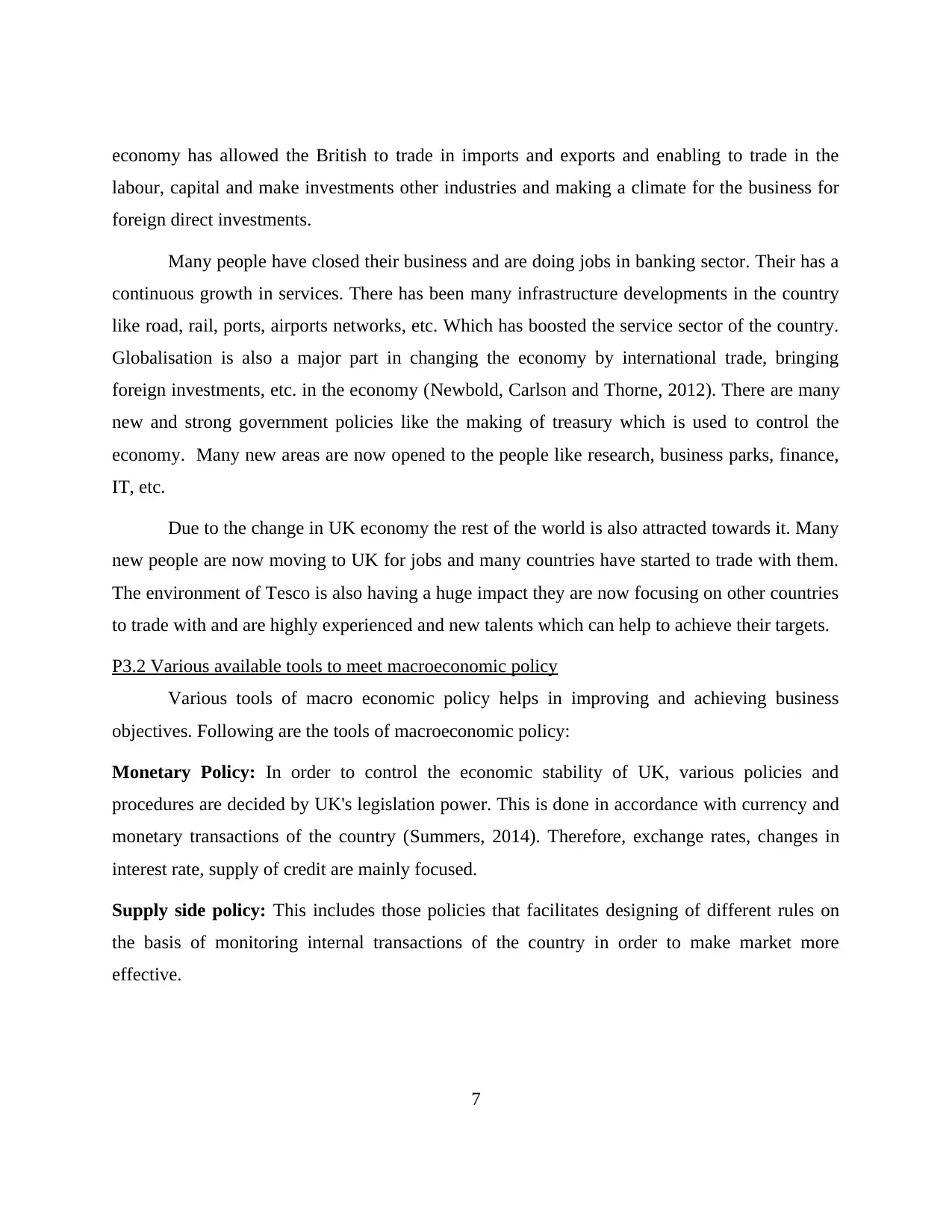
economy has allowed the British to trade in imports and exports and enabling to trade in the
labour, capital and make investments other industries and making a climate for the business for
foreign direct investments.
Many people have closed their business and are doing jobs in banking sector. Their has a
continuous growth in services. There has been many infrastructure developments in the country
like road, rail, ports, airports networks, etc. Which has boosted the service sector of the country.
Globalisation is also a major part in changing the economy by international trade, bringing
foreign investments, etc. in the economy (Newbold, Carlson and Thorne, 2012). There are many
new and strong government policies like the making of treasury which is used to control the
economy. Many new areas are now opened to the people like research, business parks, finance,
IT, etc.
Due to the change in UK economy the rest of the world is also attracted towards it. Many
new people are now moving to UK for jobs and many countries have started to trade with them.
The environment of Tesco is also having a huge impact they are now focusing on other countries
to trade with and are highly experienced and new talents which can help to achieve their targets.
P3.2 Various available tools to meet macroeconomic policy
Various tools of macro economic policy helps in improving and achieving business
objectives. Following are the tools of macroeconomic policy:
Monetary Policy: In order to control the economic stability of UK, various policies and
procedures are decided by UK's legislation power. This is done in accordance with currency and
monetary transactions of the country (Summers, 2014). Therefore, exchange rates, changes in
interest rate, supply of credit are mainly focused.
Supply side policy: This includes those policies that facilitates designing of different rules on
the basis of monitoring internal transactions of the country in order to make market more
effective.
7
labour, capital and make investments other industries and making a climate for the business for
foreign direct investments.
Many people have closed their business and are doing jobs in banking sector. Their has a
continuous growth in services. There has been many infrastructure developments in the country
like road, rail, ports, airports networks, etc. Which has boosted the service sector of the country.
Globalisation is also a major part in changing the economy by international trade, bringing
foreign investments, etc. in the economy (Newbold, Carlson and Thorne, 2012). There are many
new and strong government policies like the making of treasury which is used to control the
economy. Many new areas are now opened to the people like research, business parks, finance,
IT, etc.
Due to the change in UK economy the rest of the world is also attracted towards it. Many
new people are now moving to UK for jobs and many countries have started to trade with them.
The environment of Tesco is also having a huge impact they are now focusing on other countries
to trade with and are highly experienced and new talents which can help to achieve their targets.
P3.2 Various available tools to meet macroeconomic policy
Various tools of macro economic policy helps in improving and achieving business
objectives. Following are the tools of macroeconomic policy:
Monetary Policy: In order to control the economic stability of UK, various policies and
procedures are decided by UK's legislation power. This is done in accordance with currency and
monetary transactions of the country (Summers, 2014). Therefore, exchange rates, changes in
interest rate, supply of credit are mainly focused.
Supply side policy: This includes those policies that facilitates designing of different rules on
the basis of monitoring internal transactions of the country in order to make market more
effective.
7
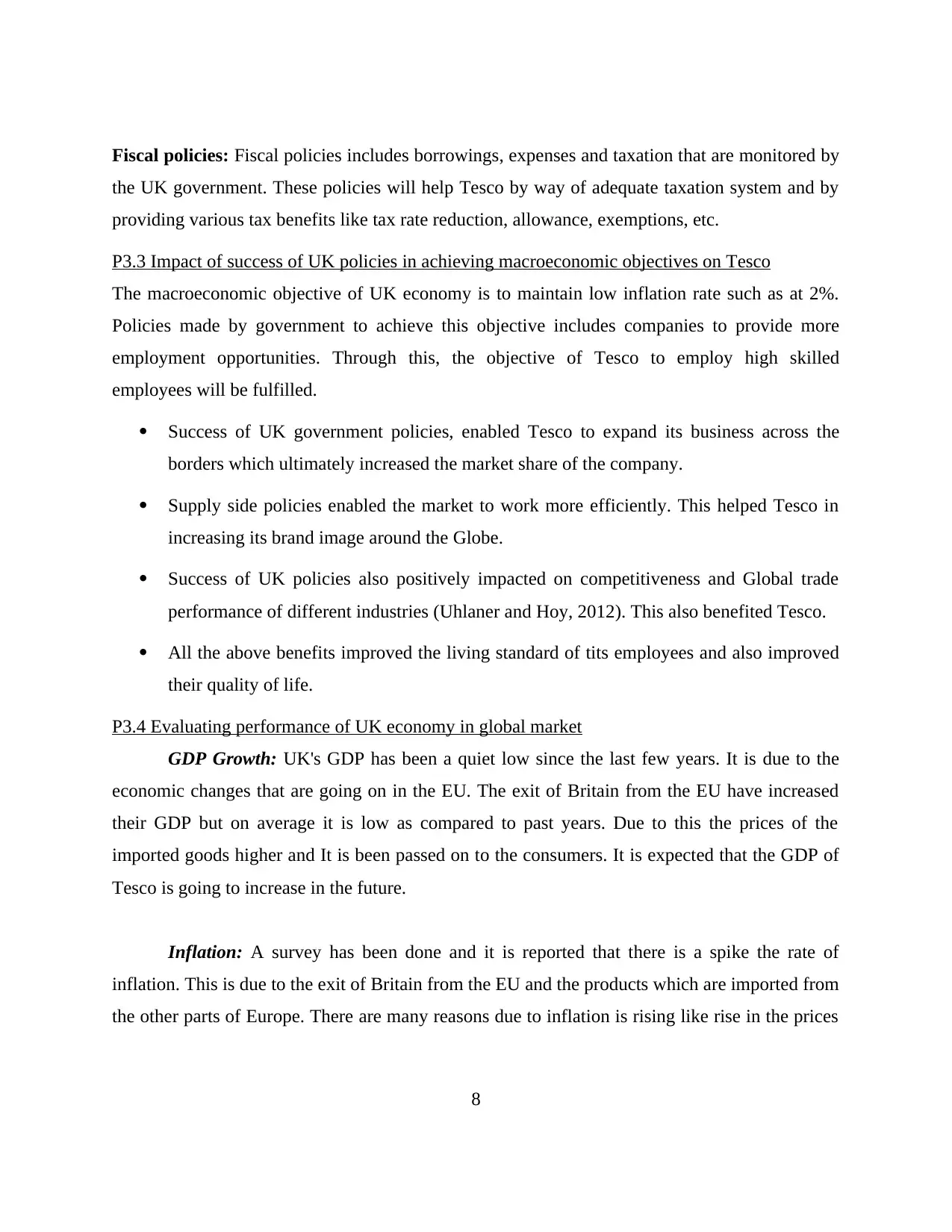
Fiscal policies: Fiscal policies includes borrowings, expenses and taxation that are monitored by
the UK government. These policies will help Tesco by way of adequate taxation system and by
providing various tax benefits like tax rate reduction, allowance, exemptions, etc.
P3.3 Impact of success of UK policies in achieving macroeconomic objectives on Tesco
The macroeconomic objective of UK economy is to maintain low inflation rate such as at 2%.
Policies made by government to achieve this objective includes companies to provide more
employment opportunities. Through this, the objective of Tesco to employ high skilled
employees will be fulfilled.
Success of UK government policies, enabled Tesco to expand its business across the
borders which ultimately increased the market share of the company.
Supply side policies enabled the market to work more efficiently. This helped Tesco in
increasing its brand image around the Globe.
Success of UK policies also positively impacted on competitiveness and Global trade
performance of different industries (Uhlaner and Hoy, 2012). This also benefited Tesco.
All the above benefits improved the living standard of tits employees and also improved
their quality of life.
P3.4 Evaluating performance of UK economy in global market
GDP Growth: UK's GDP has been a quiet low since the last few years. It is due to the
economic changes that are going on in the EU. The exit of Britain from the EU have increased
their GDP but on average it is low as compared to past years. Due to this the prices of the
imported goods higher and It is been passed on to the consumers. It is expected that the GDP of
Tesco is going to increase in the future.
Inflation: A survey has been done and it is reported that there is a spike the rate of
inflation. This is due to the exit of Britain from the EU and the products which are imported from
the other parts of Europe. There are many reasons due to inflation is rising like rise in the prices
8
the UK government. These policies will help Tesco by way of adequate taxation system and by
providing various tax benefits like tax rate reduction, allowance, exemptions, etc.
P3.3 Impact of success of UK policies in achieving macroeconomic objectives on Tesco
The macroeconomic objective of UK economy is to maintain low inflation rate such as at 2%.
Policies made by government to achieve this objective includes companies to provide more
employment opportunities. Through this, the objective of Tesco to employ high skilled
employees will be fulfilled.
Success of UK government policies, enabled Tesco to expand its business across the
borders which ultimately increased the market share of the company.
Supply side policies enabled the market to work more efficiently. This helped Tesco in
increasing its brand image around the Globe.
Success of UK policies also positively impacted on competitiveness and Global trade
performance of different industries (Uhlaner and Hoy, 2012). This also benefited Tesco.
All the above benefits improved the living standard of tits employees and also improved
their quality of life.
P3.4 Evaluating performance of UK economy in global market
GDP Growth: UK's GDP has been a quiet low since the last few years. It is due to the
economic changes that are going on in the EU. The exit of Britain from the EU have increased
their GDP but on average it is low as compared to past years. Due to this the prices of the
imported goods higher and It is been passed on to the consumers. It is expected that the GDP of
Tesco is going to increase in the future.
Inflation: A survey has been done and it is reported that there is a spike the rate of
inflation. This is due to the exit of Britain from the EU and the products which are imported from
the other parts of Europe. There are many reasons due to inflation is rising like rise in the prices
8
Secure Best Marks with AI Grader
Need help grading? Try our AI Grader for instant feedback on your assignments.
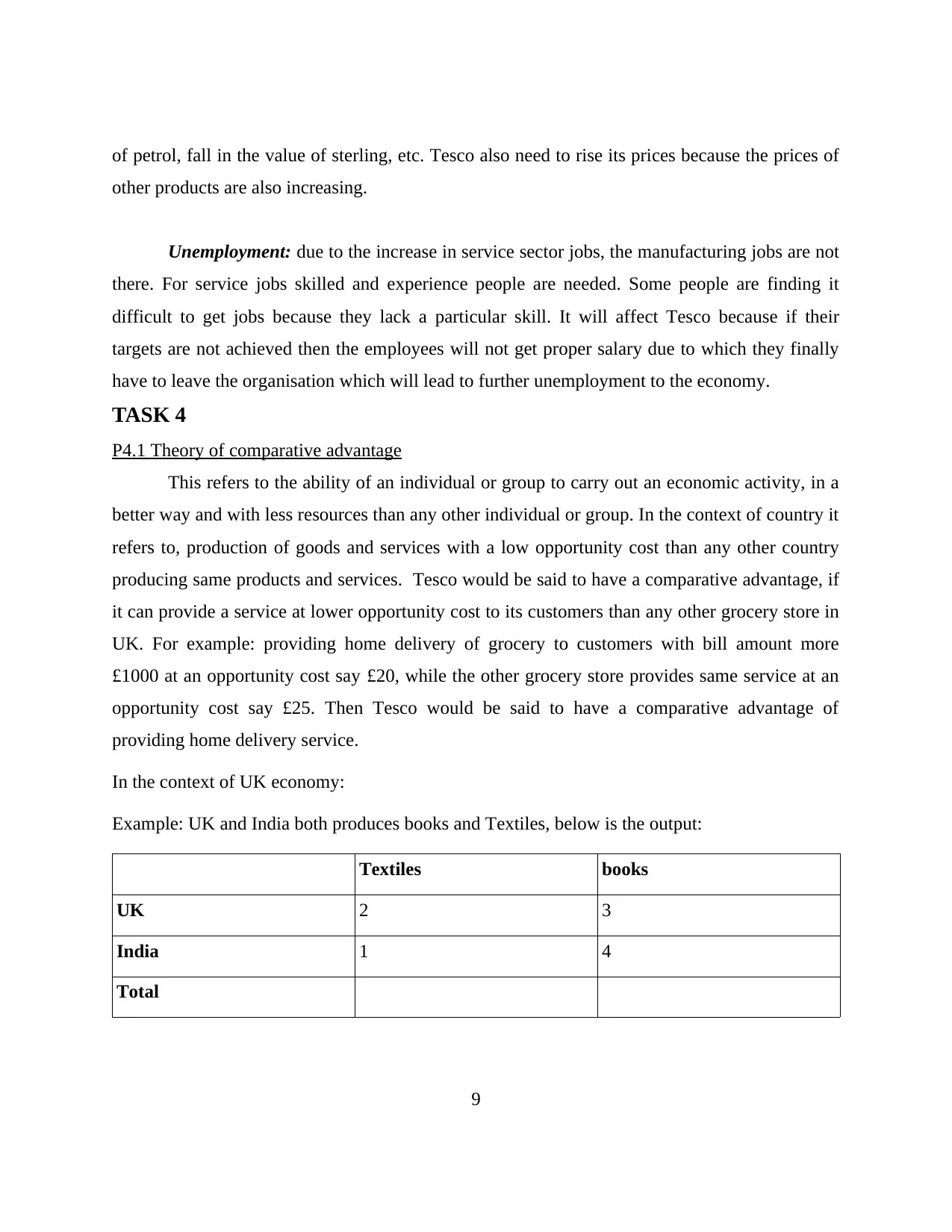
of petrol, fall in the value of sterling, etc. Tesco also need to rise its prices because the prices of
other products are also increasing.
Unemployment: due to the increase in service sector jobs, the manufacturing jobs are not
there. For service jobs skilled and experience people are needed. Some people are finding it
difficult to get jobs because they lack a particular skill. It will affect Tesco because if their
targets are not achieved then the employees will not get proper salary due to which they finally
have to leave the organisation which will lead to further unemployment to the economy.
TASK 4
P4.1 Theory of comparative advantage
This refers to the ability of an individual or group to carry out an economic activity, in a
better way and with less resources than any other individual or group. In the context of country it
refers to, production of goods and services with a low opportunity cost than any other country
producing same products and services. Tesco would be said to have a comparative advantage, if
it can provide a service at lower opportunity cost to its customers than any other grocery store in
UK. For example: providing home delivery of grocery to customers with bill amount more
£1000 at an opportunity cost say £20, while the other grocery store provides same service at an
opportunity cost say £25. Then Tesco would be said to have a comparative advantage of
providing home delivery service.
In the context of UK economy:
Example: UK and India both produces books and Textiles, below is the output:
Textiles books
UK 2 3
India 1 4
Total
9
other products are also increasing.
Unemployment: due to the increase in service sector jobs, the manufacturing jobs are not
there. For service jobs skilled and experience people are needed. Some people are finding it
difficult to get jobs because they lack a particular skill. It will affect Tesco because if their
targets are not achieved then the employees will not get proper salary due to which they finally
have to leave the organisation which will lead to further unemployment to the economy.
TASK 4
P4.1 Theory of comparative advantage
This refers to the ability of an individual or group to carry out an economic activity, in a
better way and with less resources than any other individual or group. In the context of country it
refers to, production of goods and services with a low opportunity cost than any other country
producing same products and services. Tesco would be said to have a comparative advantage, if
it can provide a service at lower opportunity cost to its customers than any other grocery store in
UK. For example: providing home delivery of grocery to customers with bill amount more
£1000 at an opportunity cost say £20, while the other grocery store provides same service at an
opportunity cost say £25. Then Tesco would be said to have a comparative advantage of
providing home delivery service.
In the context of UK economy:
Example: UK and India both produces books and Textiles, below is the output:
Textiles books
UK 2 3
India 1 4
Total
9
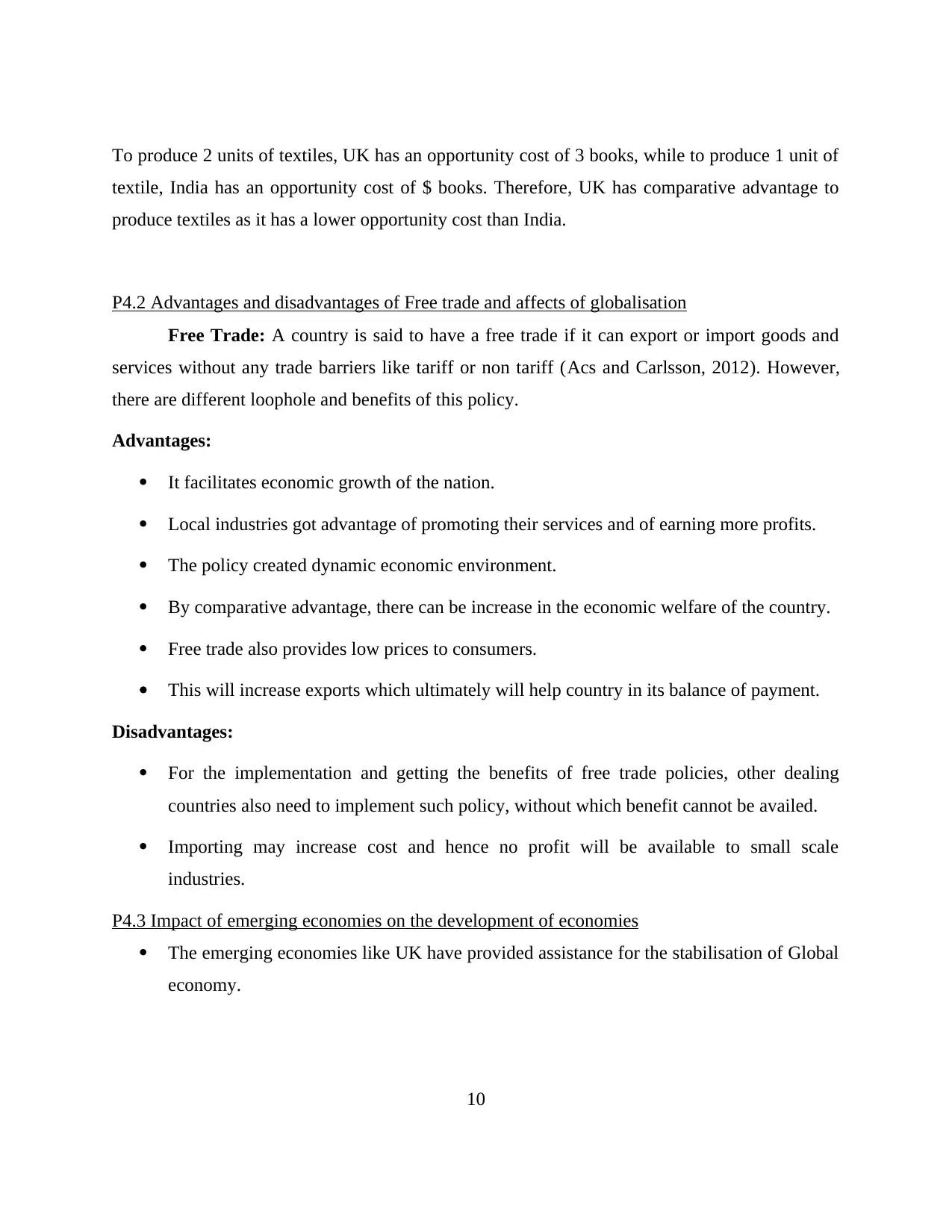
To produce 2 units of textiles, UK has an opportunity cost of 3 books, while to produce 1 unit of
textile, India has an opportunity cost of $ books. Therefore, UK has comparative advantage to
produce textiles as it has a lower opportunity cost than India.
P4.2 Advantages and disadvantages of Free trade and affects of globalisation
Free Trade: A country is said to have a free trade if it can export or import goods and
services without any trade barriers like tariff or non tariff (Acs and Carlsson, 2012). However,
there are different loophole and benefits of this policy.
Advantages:
It facilitates economic growth of the nation.
Local industries got advantage of promoting their services and of earning more profits.
The policy created dynamic economic environment.
By comparative advantage, there can be increase in the economic welfare of the country.
Free trade also provides low prices to consumers.
This will increase exports which ultimately will help country in its balance of payment.
Disadvantages:
For the implementation and getting the benefits of free trade policies, other dealing
countries also need to implement such policy, without which benefit cannot be availed.
Importing may increase cost and hence no profit will be available to small scale
industries.
P4.3 Impact of emerging economies on the development of economies
The emerging economies like UK have provided assistance for the stabilisation of Global
economy.
10
textile, India has an opportunity cost of $ books. Therefore, UK has comparative advantage to
produce textiles as it has a lower opportunity cost than India.
P4.2 Advantages and disadvantages of Free trade and affects of globalisation
Free Trade: A country is said to have a free trade if it can export or import goods and
services without any trade barriers like tariff or non tariff (Acs and Carlsson, 2012). However,
there are different loophole and benefits of this policy.
Advantages:
It facilitates economic growth of the nation.
Local industries got advantage of promoting their services and of earning more profits.
The policy created dynamic economic environment.
By comparative advantage, there can be increase in the economic welfare of the country.
Free trade also provides low prices to consumers.
This will increase exports which ultimately will help country in its balance of payment.
Disadvantages:
For the implementation and getting the benefits of free trade policies, other dealing
countries also need to implement such policy, without which benefit cannot be availed.
Importing may increase cost and hence no profit will be available to small scale
industries.
P4.3 Impact of emerging economies on the development of economies
The emerging economies like UK have provided assistance for the stabilisation of Global
economy.
10
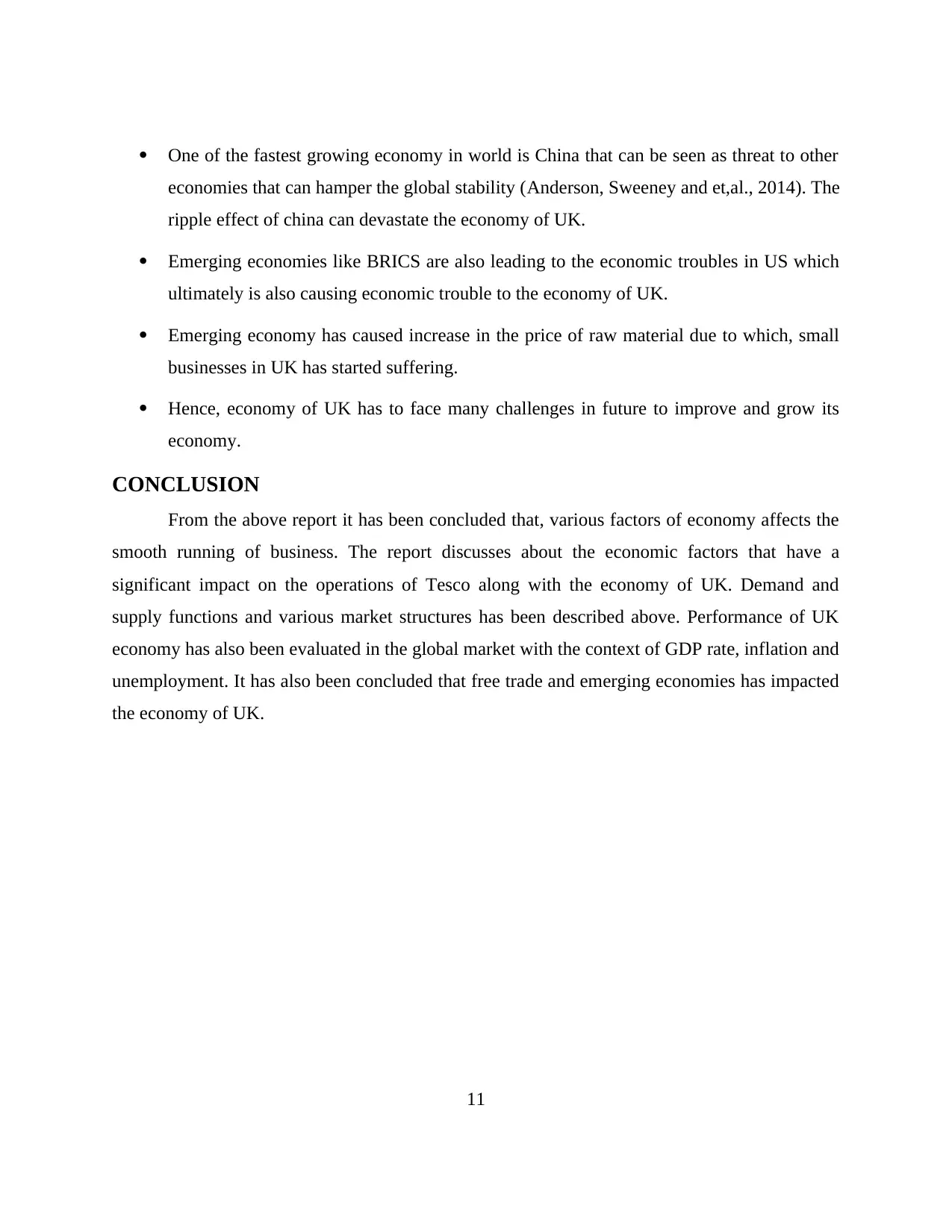
One of the fastest growing economy in world is China that can be seen as threat to other
economies that can hamper the global stability (Anderson, Sweeney and et,al., 2014). The
ripple effect of china can devastate the economy of UK.
Emerging economies like BRICS are also leading to the economic troubles in US which
ultimately is also causing economic trouble to the economy of UK.
Emerging economy has caused increase in the price of raw material due to which, small
businesses in UK has started suffering.
Hence, economy of UK has to face many challenges in future to improve and grow its
economy.
CONCLUSION
From the above report it has been concluded that, various factors of economy affects the
smooth running of business. The report discusses about the economic factors that have a
significant impact on the operations of Tesco along with the economy of UK. Demand and
supply functions and various market structures has been described above. Performance of UK
economy has also been evaluated in the global market with the context of GDP rate, inflation and
unemployment. It has also been concluded that free trade and emerging economies has impacted
the economy of UK.
11
economies that can hamper the global stability (Anderson, Sweeney and et,al., 2014). The
ripple effect of china can devastate the economy of UK.
Emerging economies like BRICS are also leading to the economic troubles in US which
ultimately is also causing economic trouble to the economy of UK.
Emerging economy has caused increase in the price of raw material due to which, small
businesses in UK has started suffering.
Hence, economy of UK has to face many challenges in future to improve and grow its
economy.
CONCLUSION
From the above report it has been concluded that, various factors of economy affects the
smooth running of business. The report discusses about the economic factors that have a
significant impact on the operations of Tesco along with the economy of UK. Demand and
supply functions and various market structures has been described above. Performance of UK
economy has also been evaluated in the global market with the context of GDP rate, inflation and
unemployment. It has also been concluded that free trade and emerging economies has impacted
the economy of UK.
11
Paraphrase This Document
Need a fresh take? Get an instant paraphrase of this document with our AI Paraphraser
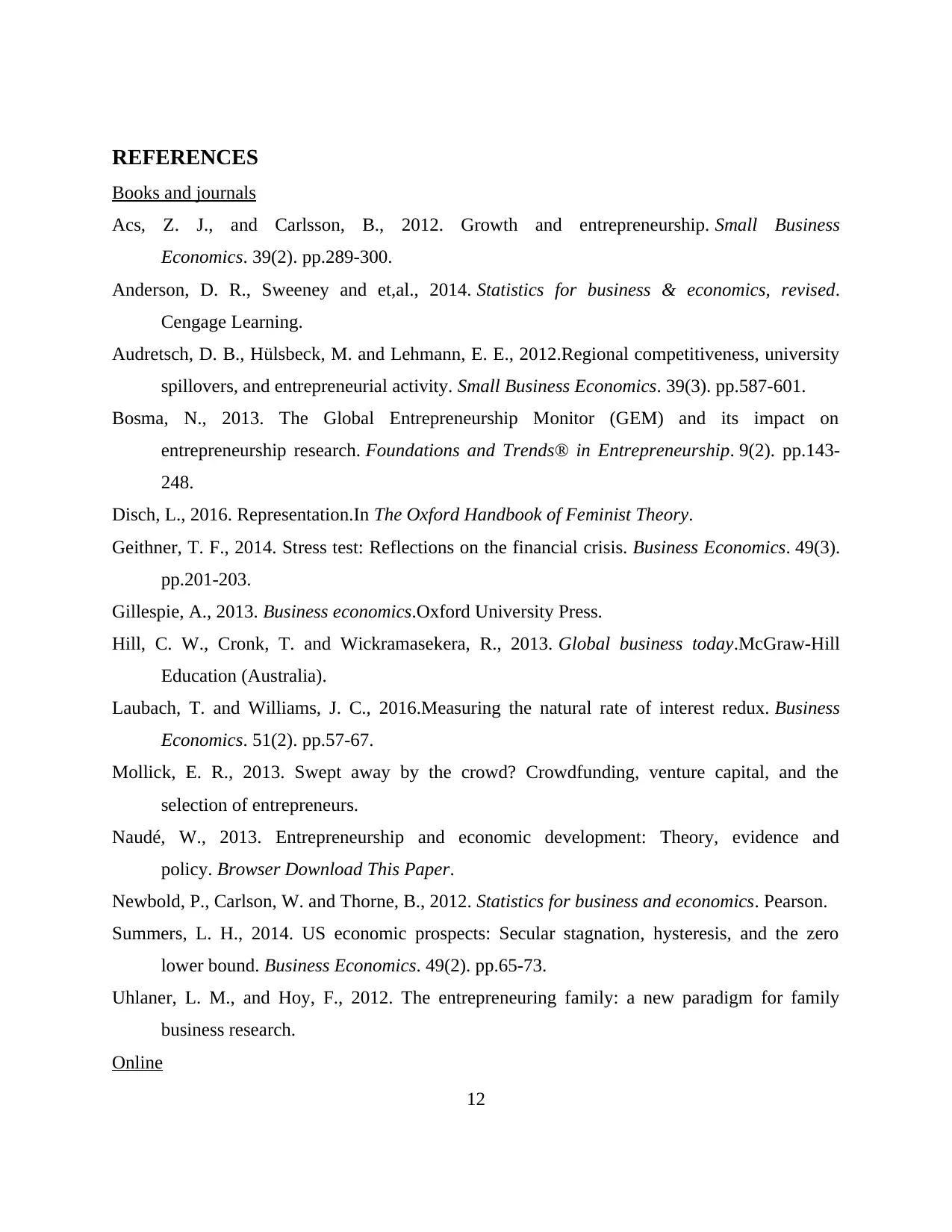
REFERENCES
Books and journals
Acs, Z. J., and Carlsson, B., 2012. Growth and entrepreneurship. Small Business
Economics. 39(2). pp.289-300.
Anderson, D. R., Sweeney and et,al., 2014. Statistics for business & economics, revised.
Cengage Learning.
Audretsch, D. B., Hülsbeck, M. and Lehmann, E. E., 2012.Regional competitiveness, university
spillovers, and entrepreneurial activity. Small Business Economics. 39(3). pp.587-601.
Bosma, N., 2013. The Global Entrepreneurship Monitor (GEM) and its impact on
entrepreneurship research. Foundations and Trends® in Entrepreneurship. 9(2). pp.143-
248.
Disch, L., 2016. Representation.In The Oxford Handbook of Feminist Theory.
Geithner, T. F., 2014. Stress test: Reflections on the financial crisis. Business Economics. 49(3).
pp.201-203.
Gillespie, A., 2013. Business economics.Oxford University Press.
Hill, C. W., Cronk, T. and Wickramasekera, R., 2013. Global business today.McGraw-Hill
Education (Australia).
Laubach, T. and Williams, J. C., 2016.Measuring the natural rate of interest redux. Business
Economics. 51(2). pp.57-67.
Mollick, E. R., 2013. Swept away by the crowd? Crowdfunding, venture capital, and the
selection of entrepreneurs.
Naudé, W., 2013. Entrepreneurship and economic development: Theory, evidence and
policy. Browser Download This Paper.
Newbold, P., Carlson, W. and Thorne, B., 2012. Statistics for business and economics. Pearson.
Summers, L. H., 2014. US economic prospects: Secular stagnation, hysteresis, and the zero
lower bound. Business Economics. 49(2). pp.65-73.
Uhlaner, L. M., and Hoy, F., 2012. The entrepreneuring family: a new paradigm for family
business research.
Online
12
Books and journals
Acs, Z. J., and Carlsson, B., 2012. Growth and entrepreneurship. Small Business
Economics. 39(2). pp.289-300.
Anderson, D. R., Sweeney and et,al., 2014. Statistics for business & economics, revised.
Cengage Learning.
Audretsch, D. B., Hülsbeck, M. and Lehmann, E. E., 2012.Regional competitiveness, university
spillovers, and entrepreneurial activity. Small Business Economics. 39(3). pp.587-601.
Bosma, N., 2013. The Global Entrepreneurship Monitor (GEM) and its impact on
entrepreneurship research. Foundations and Trends® in Entrepreneurship. 9(2). pp.143-
248.
Disch, L., 2016. Representation.In The Oxford Handbook of Feminist Theory.
Geithner, T. F., 2014. Stress test: Reflections on the financial crisis. Business Economics. 49(3).
pp.201-203.
Gillespie, A., 2013. Business economics.Oxford University Press.
Hill, C. W., Cronk, T. and Wickramasekera, R., 2013. Global business today.McGraw-Hill
Education (Australia).
Laubach, T. and Williams, J. C., 2016.Measuring the natural rate of interest redux. Business
Economics. 51(2). pp.57-67.
Mollick, E. R., 2013. Swept away by the crowd? Crowdfunding, venture capital, and the
selection of entrepreneurs.
Naudé, W., 2013. Entrepreneurship and economic development: Theory, evidence and
policy. Browser Download This Paper.
Newbold, P., Carlson, W. and Thorne, B., 2012. Statistics for business and economics. Pearson.
Summers, L. H., 2014. US economic prospects: Secular stagnation, hysteresis, and the zero
lower bound. Business Economics. 49(2). pp.65-73.
Uhlaner, L. M., and Hoy, F., 2012. The entrepreneuring family: a new paradigm for family
business research.
Online
12
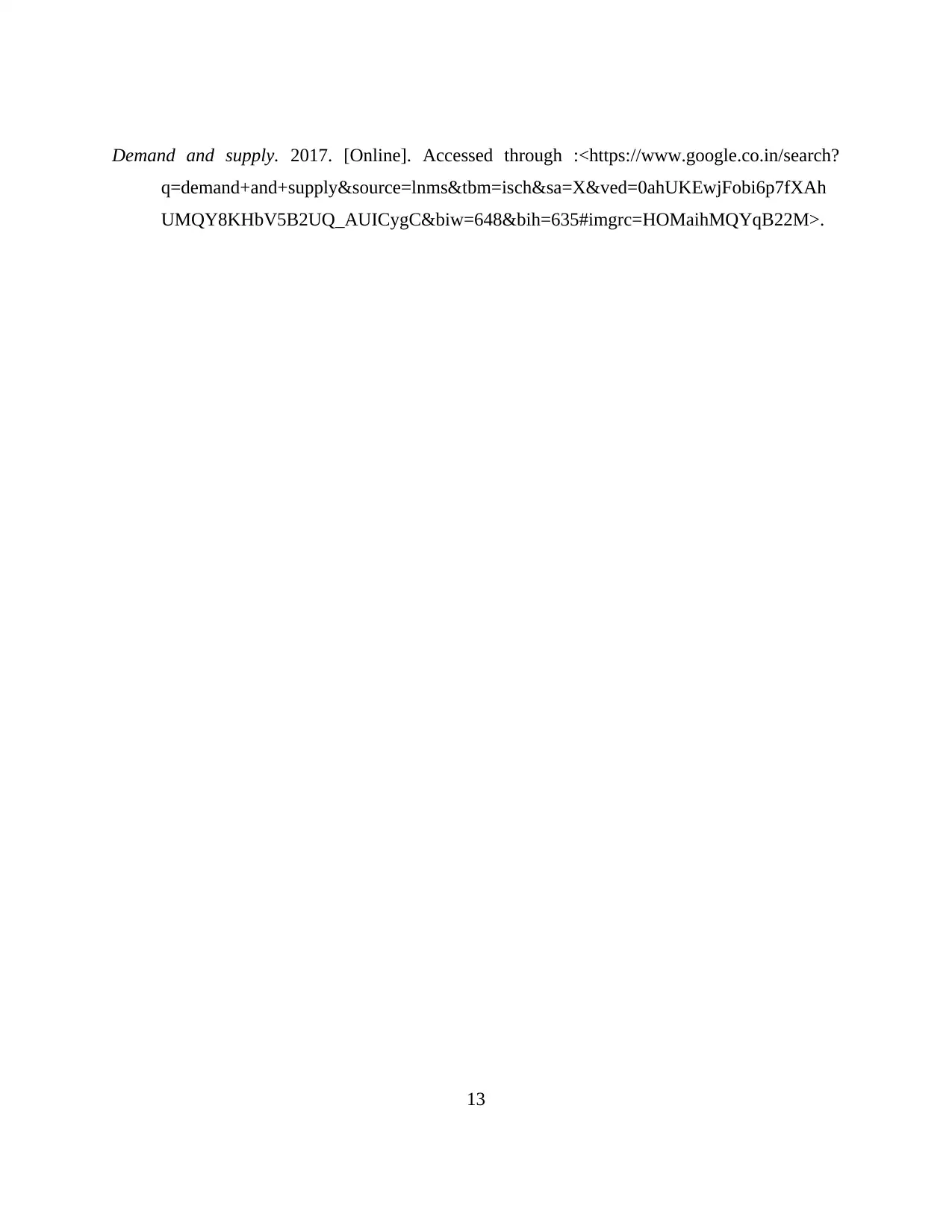
Demand and supply. 2017. [Online]. Accessed through :<https://www.google.co.in/search?
q=demand+and+supply&source=lnms&tbm=isch&sa=X&ved=0ahUKEwjFobi6p7fXAh
UMQY8KHbV5B2UQ_AUICygC&biw=648&bih=635#imgrc=HOMaihMQYqB22M>.
13
q=demand+and+supply&source=lnms&tbm=isch&sa=X&ved=0ahUKEwjFobi6p7fXAh
UMQY8KHbV5B2UQ_AUICygC&biw=648&bih=635#imgrc=HOMaihMQYqB22M>.
13
1 out of 15
Related Documents
Your All-in-One AI-Powered Toolkit for Academic Success.
+13062052269
info@desklib.com
Available 24*7 on WhatsApp / Email
![[object Object]](/_next/static/media/star-bottom.7253800d.svg)
Unlock your academic potential
© 2024 | Zucol Services PVT LTD | All rights reserved.





